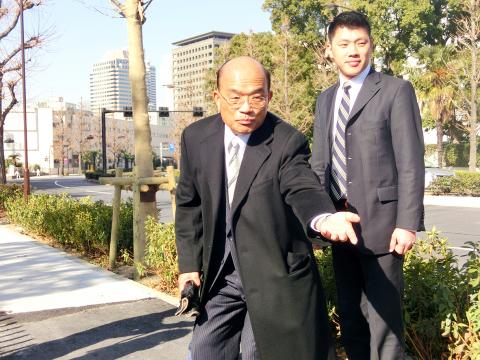|
Visiting Su touts
closer ties with Japan
COMMON VALUES: The DPP chairman stressed the
affinities between the two nations, said protecting fishing rights should take
priority in the Diaoyutais and took a swipe at Ma
By Chris Wang / Staff reporter

Democratic Progressive Party
Chairman Su Tseng-chang, left, gestures while walking along a sidewalk yesterday
outside the National Diet Building in Tokyo, Japan, where he is visiting to
discuss bilateral relations and Asia-Pacific security and stability.
Photo: Lee Hsin-fang, Taipei Times
Taiwan-Japan relations could be
strengthened to promote regional stability because both countries share the
values of democracy, freedom and human rights, Democratic Progressive Party (DPP)
Chairman Su Tseng-chang (蘇貞昌) said in Tokyo yesterday.
“The DPP hopes that Taiwan and Japan can strengthen their bilateral partnership
as members of a democratic alliance, which would make the Asia-Pacific a region
of security, stability and prosperity by promoting dialogue and closer
engagement,” Su said on the second day of his five-day visit to Japan.
Taiwan, Japan, South Korea and the US all share those same values, said the DPP
chairman, who is leading a 30-member delegation on his first overseas trip since
assuming the party leadership in May last year.
Su made the comments during his visit to the Japan-Republic Of China Diet
Members’ Consultative Council, a pro-Taiwan parliamentary group in the Japanese
Diet, and met its president — Japanese Senator Takeo Hiranuma.
Su reiterated Taiwanese affinity with Japan, saying that this was not only
because of the close proximity of the two countries, but also because of a long
history of bilateral trade and cultural exchanges.
The assistance offered by the nations to each other after the Japanese
earthquake in March 2011 and the 921 Earthquake in Taiwan in 1999 was solid
evidence of a strong friendship, Su said.
Earlier yesterday afternoon, Su visited the ruling Liberal Democratic Party
(LDP) headquarters and met LDP Secretary-General Shigeru Ishiba, a former
defense minister, to exchange views on security in East Asia, the dispute over
the Diaoyutai Islands (釣魚台), known as the Senkakus in Japan, and bilateral trade
relations.
Speaking to Taiwanese media during a visit to the National Diet Building
yesterday morning, Su dismissed reports concerning the cancelation of his
meeting with Japan Restoration Party leader Shintaro Ishihara, a right-wing
politician who initiated a spat over the disputed islands by proposing that
Japan nationalize them.
Su said the main goals of his visit were to strengthen the Asia-Pacific
democratic alliance and to promote regional stability and prosperity, rather
than meeting certain politicians.
On the Diaoyutais dispute, Su said the most urgent task for Taiwan was the
protection of fishing rights and that he was glad to see both sides are ready
for a new round of negotiations.
In response to a media inquiry about domestic political affairs, the chairman
said the appointments of Chang Chia-juch (張家祝) and Kuan Chung-ming (管中閔) as
minister of economic affairs and Council for Economic Planning and Development
minister “showed the Chinese Nationalist Party’s [KMT] talent drought.”
“The thing that this administration should carry out is probably not a change of
personnel, but a change of policy, because [President] Ma [Ying-jeou’s (馬英九)]
policies are being questioned by the people,” he said.
The delegation arrived in Tokyo on Sunday and is scheduled to return to Taipei
on Thursday.
|
![]()
![]()
![]()